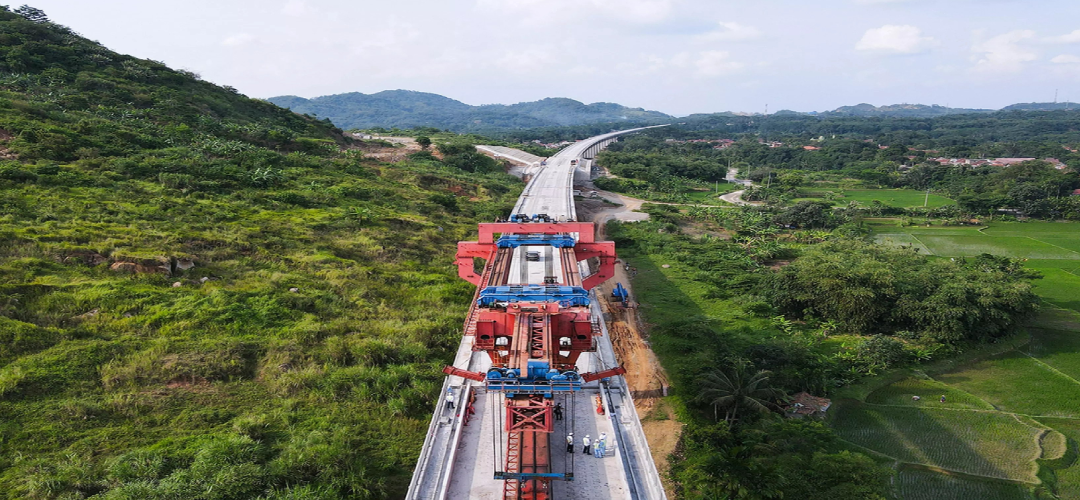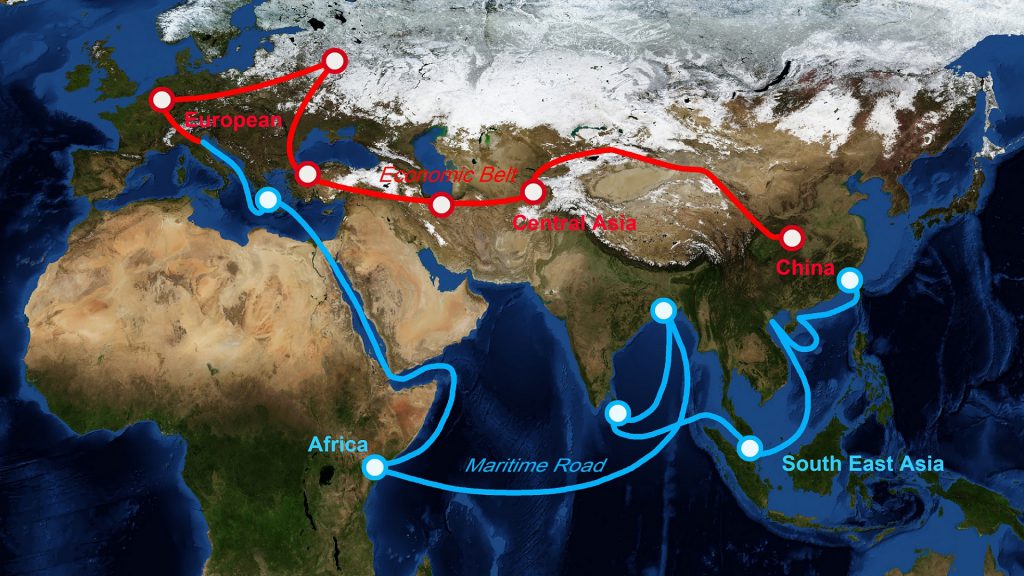BRI Welcomes Its Latest Client
October 21, 2023 | Expert Insights

The Belt and Road Initiative (BRI) has been, for a long time, seen as a symbol of China's economic overreach. Its spread over Central and South Asia has been hampered by the incessant conflict in Afghanistan, a natural land bridge between these two regions.
Since the Taliban came back to power in Afghanistan in 2021, the Chinese have been making overtures to them. Pakistan has acted as a key intermediary in this regard. Last year, in April, China became the first non-Muslim majority country to recognise the Taliban, and a few days later, they were followed by Russia. Obviously, some consultations had taken place between the two powers.
Background
Pakistan has played a key role in bringing Afghanistan closer to China despite their growing differences. In May, Pakistan's Foreign Ministry formally announced the extension of the Chinese Belt and Road Initiative (BRI) into Afghanistan, holding out the promise of an inflow of billions of dollars to rebuild the sanction-hit, war-ravaged nation. Afghanistan would also get a slice of the US$ 60 billion CPEC, it was reported.
It was clear that this move would be made official once Kabul received an invitation to the summit. In the background of the recently concluded BRI summit held in Beijing to mark the first decade of this ambitious project, the acting Commerce Minister of the Taliban government, Haji Nooruddin Aziz, announced his nation's formal request to join the CPEC. He also voiced his fervent desire to welcome investors (Chinese?) into his country.
Afghanistan's economic state needs little elaboration- despite billions of dollars pumped into the country during the two-decades-long American intervention, the country is little better than it was two centuries back. The Western development aid (including that of India) was restricted to areas controlled by the U.S.-backed regime, largely confined around Kabul and other provincial headquarters. The bulk of the remote countryside remained under the Taliban's de facto control and benefited little from the benevolence of the democratic world. Today, Afghanistan is a completely impoverished country.
This is unfortunate as the country is abundantly blessed with a variety of natural resources awaiting to be put to better use for the citizens of this blighted land. According to one estimate, in 2010, Afghanistan had untapped deposits ranging from copper to gold to lithium. At that time, the total value was between $1 trillion and $3 trillion. After thirteen years, this value is going to be much more.
However, quietly behind the scenes, China has already made inroads in exploiting the rich natural resources of Afghanistan. Many Chinese companies, including the giant Metallurgical Corp. of China (MCC), are already operating inside Taliban-controlled areas. They signed a number of agreements with the previous Afghan government in this regard. At that time, the U.S.-led forces gave protection to Chinese companies in the country. All this collapsed when the Western-backed Afghan government was overthrown. With the Taliban back in power, China is once again trying to make inroads into Afghanistan.

Analysis
Afghanistan under Taliban 2.0 is economically isolated and desperately needs an external hand to hold onto; no one could be better than China, which has little moralistic moorings in its financial and political couplings with other nations. Chinese recognise an economic opportunity when they see one and are never put off by liberal considerations. International economic competition is non-existent in Afghanistan at the moment; the field is wide open for the taking.
Human rights considerations still bog down other countries. Taliban 2.0 has turned out to be no different from Taliban 1.0 with no improvement in their policies, especially towards women and other marginalised segments of society. China has no qualms in dealing with the Taliban with their poor human rights record.
China has a few advantages in its dealings with Kabul. First, unlike Russia, it is free of any historical baggage, having never tried to make inroads into the region. Sensibly, over the centuries, they have patiently allowed the 'Great Game' to be played out in the region, exhausting successive external players, the last being the U.S. Now, the situation is ideal to step in for Beijing.
Interestingly, in its earlier avatar, the Taliban always considered the atheist Chinese as an enemy of Islam, especially considering the atrocities perpetrated in China's Xinjiang province. However, using Islamabad as an intermediary, the channels of communication between Kabul and Beijing have also remained operational, irrespective of the regime in power in Kabul. Whenever Chinese engineers were abducted in the restive border region between Afghanistan and Pakistan by the Pakistani Taliban, it was the Afghan Taliban that stepped in and organised their safe release.
However, with the changing dynamics of the Pak-Afghan relationship, Taliban 2.0 seems to have shed this intermediary connection and started speaking directly to Beijing as an equal partner. Islamabad would not be happy with his development, and even more, if precious funds are diverted to Afghanistan as the CPEC takes shape within the latter's territory.
If the Taliban can ensure a fair modicum of security in the areas specified by Beijing for its exploitation, we could see the CPEC making faster progress in Afghanistan than it has done over the last decade in neighbouring Pakistan!
The success of CPEC/ BRI has immense geopolitical dividends for China, a result that it has patiently awaited all these ten years while pumping trillions into the enterprise. President Xi Jinping considers this the monument that will forever remind the Chinese people and the world of his achievements as the longest-serving Chinese leader, overshadowing even the venerated Chairman Mao.
However, like all investments, CPEC in Afghanistan has its own risks and challenges. For one, it would be a mistake to take for granted that the Afghans will toe the Chinese line meekly; Beijing's experience with the restive and troublesome tribes of Baluchistan should be taken as an indicator. Secondly, Afghanistan is landlocked, and its infrastructure has changed little from when the British invaded it in the 18th and 19th centuries- roads, rails, and communication links must be built from scratch. This would need billions of dollars at a time when the Chinese economy has stopped growing due to decoupling and internal financial upheavals.
The Indian Viewpoint
India looks at these developments with concern, as was made clear by the Indian foreign ministry last year when the first official announcements emanated from Pakistan of the invitation being extended to Kabul to join CPEC. However, there is little that New Delhi can do about it. While the Pakistani leg of the CPEC justifies Indian objections as it trespasses into Pak-Occupied Jammu and Kashmir, India has no raison d'être to register its protest for what transpires in Afghanistan. Of course, it would be disappointing that while it has been seeking a land bridge to connect to Central Asia through Afghanistan (and Pakistan), China is already there. However, this is no reason to abandon its efforts to keep open a channel of communication with Kabul and continue to make consolatory gestures.
Assessment
- Chinese penetration of Afghanistan could not have happened if the international community had not neglected the country. Beijing has taken full advantage of a political vacuum. This must be rectified.
- India would be concerned about expanding Chinese influence into the region, which would curb Indian efforts to seek a land bridge into Central Asia. However, India has to continue to work towards coming to some kind of working relationship with the Taliban, the de-facto rulers of Afghanistan, and even more so as splits appear in the 'strategic' relationship with Pakistan.
- In a more prosaic tone, no one should begrudge the Afghan people their right to prosper and enjoy the fruits of their natural resources. Seldom have a nation suffered more from war and invasions than the Afghans. Hopefully, the Chinese intervention will improve the lot of the common Afghans eking out a living in the remote corners of this rugged land.








Comments